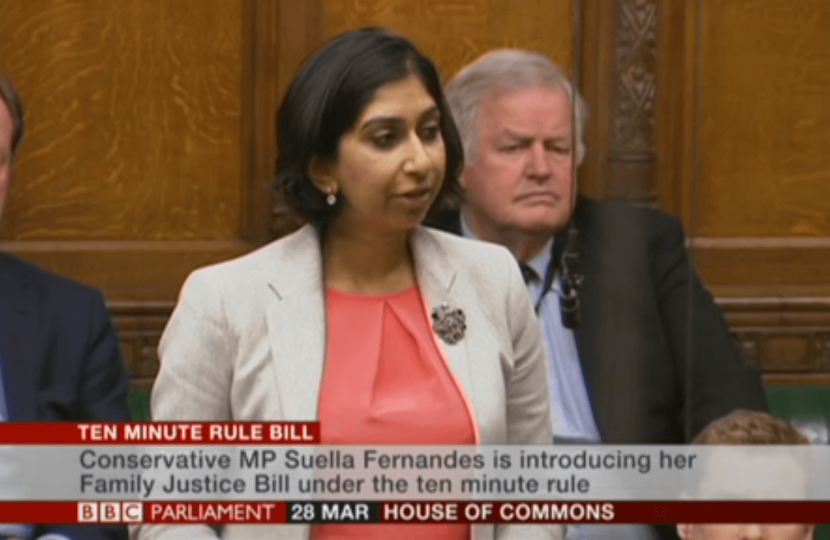
I presented a Ten Minute Rule Bill to the House today, calling on the government to be tougher on enforcing child arrangement orders – orders made by courts to regulate the contact and residence of children on divorce – which are currently breached more or less with impunity. The courts are slow to respond and reluctant to penalise non-compliant parents, sending the damaging message that court orders are optional, not mandatory and that the relationship with the non-resident parent is meaningless, rather than crucial. In the worst cases has led to the non-resident parent, usually the father, being denied contact with their child for several years.
Robust enforcement is better for the family, and society. Children with a meaningful relationship with both parents are less likely to experience depression, teenage pregnancy and delinquency. Conversely, children without a father in their life often struggle to reach their full potential academically, socially and professionally. But, the law does not reflect this because of the failure to crack down on intransigent parents, and because judges and social workers turn a blind eye to parental alienation.
A new, tougher approach to enforcement is needed. A three strikes approach is long overdue, under which residence should be transferred, if that is safe, and community service should actually, not theoretically, be imposed on parents who breach the order. Other options, such as the confiscation of driving licences or passports, should also be seriously considered by Parliament.
A presumption in favour of shared parenting should be established when determining the contact and residence of the children. Every child has a right to a meaningful relationship with both parents. At present, the weak starting point for child arrangement orders is based on “parental involvement […] direct or indirect”, which has been on the statute book since 2014. Although that was an improvement on the previous position, parental involvement can amount to a birthday card or a Christmas card in the worst cases. Fathers are essentially erased out of their child’s life, with all of the perennial problems that come with an absent father.
So we desperately need a rebuttal presumption of shared parenting. Such a principle is commonplace elsewhere around the world. In the US states of Iowa and California, it assures the child of an opportunity for the maximum continuing and frequent contact with both parents, and encourages the parents to share the rights and responsibilities of raising the child. It could go even further to “encourage the love, affection, and contact between the children and the parents”, as in Colorado.
Shared parenting and robust enforcement form part of the package of reforms that is needed if we are to bring our antiquated family law into the 21st century. We also need a commission to look into reform of wider aspects of family justice. Some of the areas in direst need of redress include:
- England’s fault-based divorce. Not all marriages end because of fault. We therefore have a law that promotes the allocating of blame, setting parties on a confrontational path that fuels animosity and costs. A commission should report on whether it is now time for no-fault divorce.
- Financial remedies and maintenance. Today many women are able to support themselves, so divorce should not mean an automatic entitlement to lifetime support from an ex-husband. Unless Baroness Deech’s Bill on this subject secures Royal Assent, a commission should make recommendations on how to strike a better balance.
- Cohabiting couples with children are the fastest-growing type of family in the UK. Between 1996 and 2016, the number of couples in this position increased from 1.5 million to 3.3 million. But, they have no rights in the event of a split.
- The enforceability of prenuptial agreements should be set out by Parliament. To support marriage, there is a need to recognise that people are getting married later in life, with assets earned before and during their union. This group of people should be protected, if the parties agree, not put at risk, and a commission should look into this.
- Reform of the way in which the family courts operate in public law needs wholesale review. Far too many children are taken into care for wholly inadequate and poorly argued reasons, according to Sir James Munby, president of the Family Division. Only the glare of publicity will enable this to stop, so we need to remove the cloak of secrecy and to open up our family courts.
- Most family disputes need not see the inside of a courtroom. Better incentives to use mediation or solicitor negotiation are needed, for example by virtue of a costs penalty for parties who draw out the process. Saving costs, time and heartache should be priorities.
So, I am proposing three ways to help modernise the family law system:
- To make provision for the enforcement of Child Arrangement Orders, including times within which enforcement action must take place;
- to establish a presumption in favour of shared parenting under Child Arrangement Orders;
- and to make provision for a commission to review and make recommendations on the operation of family justice; and for connected purposes.
The government now needs to put reform of family justice at the top of the agenda. I have received wide ranging support from MPs of all stripes. I hope the Government will use my bill to make our family law system fit for the 21st century.
